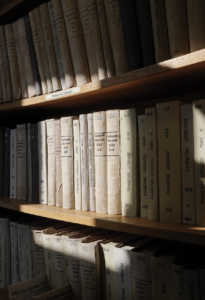5. Collections and Editions: Libraries and Archives
 It is hard to imagine doing research in the humanities without searching through libraries and archives. Nowadays, the Internet plays the role once fulfilled by great libraries. The need to gather all available knowledge in one place was, however, already present in antiquity. In the third century BC, the Macedonian rulers of Egypt built a library in Alexandria, whose ambition was to collect all Greek literature.
It is hard to imagine doing research in the humanities without searching through libraries and archives. Nowadays, the Internet plays the role once fulfilled by great libraries. The need to gather all available knowledge in one place was, however, already present in antiquity. In the third century BC, the Macedonian rulers of Egypt built a library in Alexandria, whose ambition was to collect all Greek literature.
The ideal of the “pan-library” had a profound influence on the culture of the Hellenistic period. The famous centres of Greek culture and their collections, however, have only survived in legend. This legend was shaped by the Romans, who were fascinated by the concept but never built their own “super-library”. What did their empire of books look like? K. Pietruczuk explores this question in her book titled Chasing the Idea of Completeness: Great Book Collections in the Roman World.
A collection of studies by D. Ulicka, titled Doświadczanie czasu w przestrzeni archiwum (Experiencing Time in the Space of the Archive), deals with archives and their role in the study of language and literature. This book is about what an archive actually is, what can be found in it, and what is missing (and why). It also delves into the themes of remembering and forgetting, as well as into how and by whom the tales about the past are constructed. Numerous archives have been used in a monograph and an anthology published as part of the project titled Wiek teorii. Sto lat polskiej myśli teoretycznoliterackiej (The Age of Theory: The Century of Polish Theoretical Literary Studies), led by the same scholar.
The history of literary studies, literary criticism and other aspects of the historical-literary process are the focus of the volume titled Historie literatury polskiej 1864–1914 (Histories of Polish Literature 1864–1914), edited by U. Kowalczuk and Ł. Książyk. A two-volume publication by the same editors, titled Szkoła Główna. Kręgi wpływów (The Main School: Circles of Influence), is concerned with students and professors of the institution that operated from 1862 to 1869 when the University of Warsaw was shut down by the Russian authorities, the circulation and transmission of knowledge within it, and the significance that the Warsaw Main School had for Polish culture despite its short existence.
(In the photo: one of the Faculty’s libraries; photo by M. Kaźmierczak)
